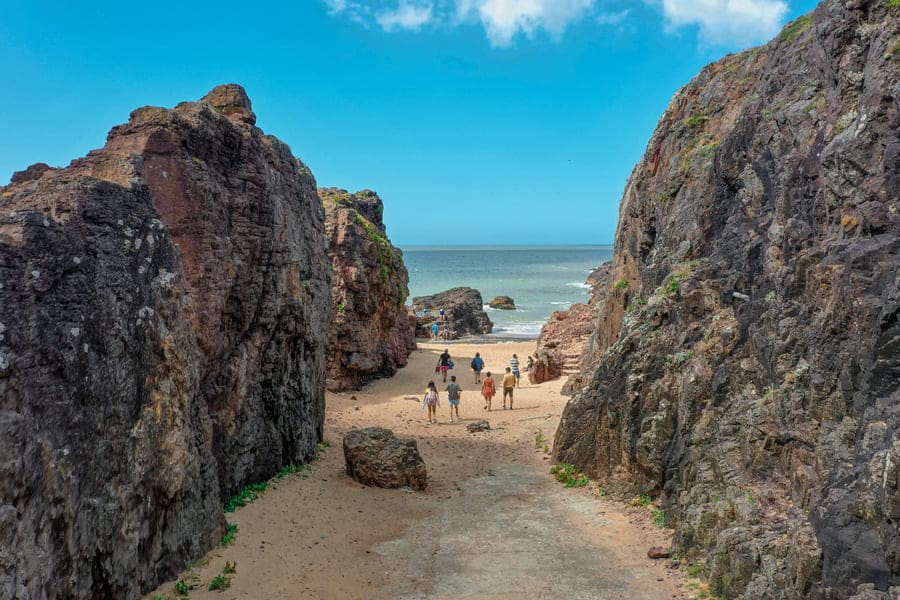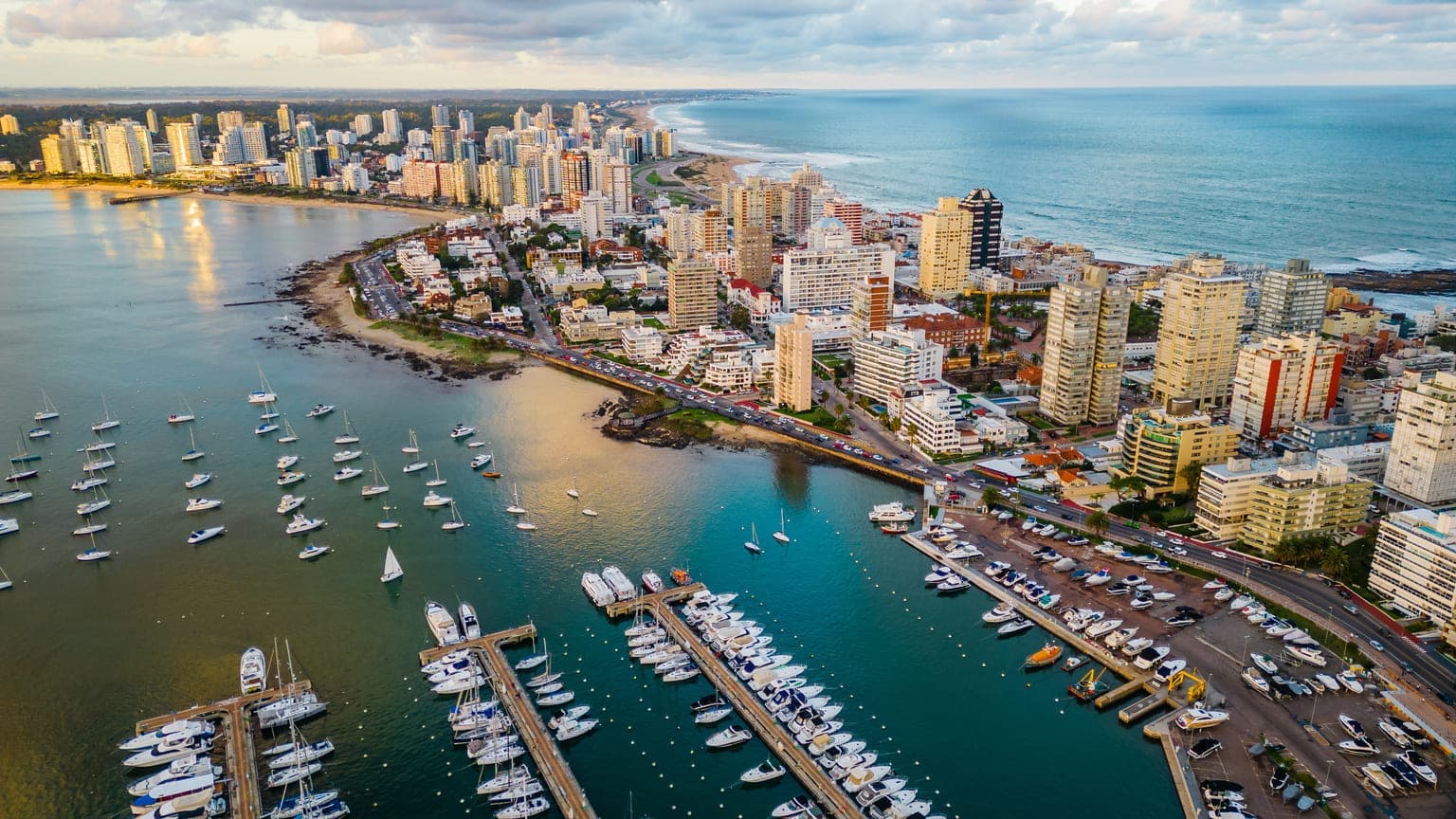Summary
Uruguay is the perfect blend of Latino and European cultures. Since the country welcomes expats from around the world, they are heavily influenced by them. There is no need to adapt to a different culture or traditions.
Wealthy foreigners can obtain legal or tax residency in Uruguay. To do so, they invest at least $100,000 in the country’s economy.
Investors can also obtain a rentier visa or move to Uruguay as financially independent persons with a stable income of at least $1,500. Let’s take a closer look at a residence permit in Uruguay.
5 benefits of getting a residence permit in Uruguay
1. Citizenship in 3 or 5 years. Married couples can apply for Uruguay citizenship 3 years from the day they filed for permanent residency, not the day they obtained it. Single applicants can do the same in 5 years.
To obtain citizenship in Uruguay, residents should not spend more than 6 months abroad during each of said 3 or 5 years.
The Uruguayan passport allows its holders to travel visa-free to 150+ countries. These include the Schengen Area, South America, the UK, Singapore, and Japan.
2. Access to healthcare in Uruguay. Legal residents of Uruguay can seek treatment in public and private medical facilities across the country. The local identification card, or cardédula de identidad, grants the right to receive free healthcare.
Uruguay offers three types of healthcare plans: public, private, and funded by the employers. Legal residents can use any of them to ensure their safety and receive medical treatment timely.
3. Right to live and work in the country. The whole family can obtain residence in Uruguay. Persons over 18 can work in the country if they have obtained permanent residency. Rantier visa holders cannot work with their visa. Uruguay’s tax residents can open businesses and generate income in Uruguay.
Once a residence card is received, a foreigner can stay in Uruguay for unlimited time. All personal belongings can be moved to Uruguay duty-free.
4. Uruguay is an expat-friendly country. Foreigners can easily open a bank account or rent or buy property in Uruguay. Even though most of the Uruguay population does not speak English, there is no linguistic profiling. Locals usually do not discriminate against those who do not speak Spanish and are ready to assist them.
The immigration authority of Uruguay does not typically reject applications from those willing to live, retire, or work in Uruguay. If the applicant meets all the requirements for permanent residency, they will obtain it.
5. Strong economy and safety. Uruguay is often called “South American Switzerland” since the country’s GDP is on the same level as some European countries. However, the cost of living in Montevideo, the capital of Uruguay, is about 15% more affordable than in Lisbon or other European capitals.
Uruguay ranked 50th in the Global Peace Index. It is one of the safest countries in South America. To compare, South Korea was ranked 43rd, and Greece was ranked 60th. The likelihood of being robbed, injured, or harmed by natural disasters is low in Uruguay.
Disadvantages of residence permit in Uruguay
Life in Uruguay has both pros and cons. Here’s also what to expect:
1. It can take up to a year to get permanent residence. The terms depend on the business of the immigration centres of Uruguay and can be from 4 to 12 months.
2. The country demands that expats spend time in Uruguay. While the application is being processed, the applicant must show their will to reside in Uruguay. The applicants should live in Uruguay for approximately 9 out of 12 months a year for permanent residence. However, living in the country is optional once the permanent residence card is issued.
3. A re-entry fee. Once the application is submitted and until permanent residence is granted, applicants must pay for a re-entry permit each time they leave the country — about $40.
4. A visit to Uruguay is required. The residence permit or citizenship application can only be submitted in person in Uruguay. Permanent residence can be revoked if a legal resident spends more than 3 years abroad.
Tax residency in Uruguay
Tax residency, often called a Uruguay Golden Visa, is a different type of residence than a legal one. Uruguay issues a tax residence certificate as proof of residency. It does not relate to legal residency and only applies to someone who meets the requirements below.
How to become a tax resident. Uruguay welcomes foreign businesses and offers several options for investors to become tax residents:
-
Making an investment of $510,000 or more in real estate and spending at least 60 days a year in Uruguay.
-
Making an investment of $2,180,000 or more in real estate without spending at least 60 days a year in Uruguay.
-
Investing $2,180,000 or more in any company in Uruguay and generating at least 15 full-time jobs.
-
Investing $2,180,000 or more in real estate.
-
Investing at least $6,530,000 in any company of national interest in Uruguay.
-
Generating higher income in Uruguay than in any other country. It cannot be passive income, for example, from rental property.
Another path of obtaining tax residence in Uruguay includes spending at least 183 days a year in the country. 140—150 days a year are allowed and qualify for tax residency in case of short-term necessary travel abroad. Those who have invested in the country can spend 60 days a year to keep their residency.
Applicants can also prove that their vital interests are located in Uruguay and become tax residents.
The application for permanent residence by investment takes from 4 months to consider. During this time, the investor gets a temporary residence permit for 2 years.
What to do to keep tax residency. Tax residency is to be proved annually. The grounds for obtaining the permit can differ from year to year. For example, for the next year, investors can choose another option and generate income instead of investing in real estate.
Tax residents of Uruguay who have already obtained residence can extend their residency for 5 additional years by investing $510,000 in real estate in Uruguay. This only applies to applicants whose first residence permit is no older than 5 years.
Alternative residency options. An investment of $500,000+ can grant residency in other countries, for example, in the EU. For example, Greece offers a 5-year residence, while it is possible to get a 10-year residence permit in Hungary. In these countries, there is no residing or tax obligations, and some benefits may apply.
Benefits of obtaining tax residency in Uruguay
Tax residents enjoy special rights and privileges in the country. Among them are:
-
tax holiday during the first 11 years of tax residency — no tax on foreign income;
-
from the 12th year onwards, only two types of foreign income are taxed at a 12% rate: interests and dividends;
-
rental income or capital gains are not taxed at all;
-
there is no property tax on foreign assets.
The Corporate Income Tax for income sourced in Uruguay is at a rate of 25%. There is no tax credit for taxes paid abroad. The exception is when double taxation agreements are in force. Double taxation is also avoided by crediting taxes paid overseas over taxed interests and dividends.
As an alternative to the tax holiday, residents can pay 7% of the tax for two taxed options during an unlimited period.
Other ways to obtain residency in Uruguay
Uruguay recognizes two types of residency: legal and tax residence. These are two separate concepts. Let’s dwell on the ways to become a legal resident of Uruguay.
A residence permit for opening or registering a company in Uruguay is issued for 2 years. Residents can extend it for 2 more years if a company still operates in Uruguay.
Entrepreneurs include a certified confirmation of company registration in Uruguay and a tax registration certificate in the application.
A rentier visa is an option for foreigners with a stable passive income of at least $1,500 per month sourced outside Uruguay. The visa grants a residence permit. Those with a rentier visa cannot work in the country but can obtain permanent residence in 2 years.
Rentier visa applicants pay a fee of $10,000. If they include a spouse and children in the application, the contribution increases by $2,000 for all dependents.
Financially independent individuals can move to Uruguay as part of a program for retirees. The requirements for this type of residence permit are regulated by Decree No. 119/004.
Passive income, such as pensions and any other legal income sourced outside Uruguay, qualify for this type of residence. To obtain a residence permit under an accelerated procedure, retirees:
-
confirm monthly income of at least $1,500;
-
buy real estate or government securities for $100,000 or more.
If the property’s value is less than $100,000, the difference can be made up by purchasing securities. Investment properties and securities cannot be sold for 10 years to maintain a residence permit.
Digital nomads can also enter Uruguay and obtain a residence permit there. Remote workers can stay in the country for up to 12 months. To do this, they visit the country with their tourist visa and apply for a digital nomad visa: confirm their income and fill out the form online.
The digital nomad visa is issued for 6 months. Foreigners can extend it for another 6 months or apply for permanent residence immediately.

While awaiting the permanent residence cards to be issued, foreigners can enjoy the local nature. For example, visit Punta Ballena and relax on its beautiful beaches
Who can obtain a Uruguay residence permit
An investor should be 18 years old, in good physical condition, and with no criminal record to qualify. They also confirm their stable income and demonstrate a flow of funds needed to live in Uruguay.
Family members who can get a residence permit along with the investor are a spouse and financially dependent children and parents.
Documents required to apply for Uruguay residency
All the documents should be translated into Spanish and properly apostilled:
-
A passport valid for at least 1 year after the application and a birth certificate.
-
Marriage certificate, if applicable.
-
2 photos.
-
Birth certificates for children, if applicable.
-
Medical check-up documents stating the overall wellness of the applicant. It can be obtained from one of the private clinics in Uruguay in 1 day.
-
The vaccine certificate is required, along with medical check-up documents.
-
Proof of no criminal record from the country of origin. It should be no older than 6 months before the application date.
-
Proof of income, no older than 30 days before the application. Only one proof of income is needed for those applying with their spouse. The proof of income should state the necessary funds to support an investor and their family in Uruguay and demonstrate the funds stream.
-
Medical insurance.
-
Proof of renting or buying property, if applicable.
-
Paid a fee of $3,245 per main applicant.
How to get Uruguay residency: a step-by-step procedure
Obtaining Uruguay permanent residency takes up to 12 months and typically has no delays or ungrounded rejections. Immigrant Invest lawyers assist during every step.
1 day
The Due Diligence Check
Immigrant Invest lawyers conduct a preliminary Due Diligence check. A passport is the only document needed for this check. Due Diligence will help identify possible risks and reduce the risk of refusal of a residence permit in Uruguay.
Immigrant Invest lawyers conduct a preliminary Due Diligence check. A passport is the only document needed for this check. Due Diligence will help identify possible risks and reduce the risk of refusal of a residence permit in Uruguay.
Up to 1 month
Getting a visa to Uruguay
To enter Uruguay, applicants need a visa. It can be a tourist visa or any other short-term visa. No visa is required if the country of origin is the US, Canada, Australia, New Zealand, South Africa, and Japan. Some countries in Asia and Latin America also have visa-free agreements with Uruguay.
To enter Uruguay, applicants need a visa. It can be a tourist visa or any other short-term visa. No visa is required if the country of origin is the US, Canada, Australia, New Zealand, South Africa, and Japan. Some countries in Asia and Latin America also have visa-free agreements with Uruguay.
Up to 1 month
Collecting, apostilling and translating necessary documents
The Immigrant Invest lawyers prepare documents based on the selected type of residence permit. For example, to obtain a residence permit for financially independent persons, applicants must obtain a certificate of income and provide proof of real estate ownership in Uruguay.
The Immigrant Invest lawyers prepare documents based on the selected type of residence permit. For example, to obtain a residence permit for financially independent persons, applicants must obtain a certificate of income and provide proof of real estate ownership in Uruguay.
1 day
Booking a medical test appointment
Applicants need to provide proof of general wellness. The lawyers will book an appointment with one of the certified private clinics.
Applicants need to provide proof of general wellness. The lawyers will book an appointment with one of the certified private clinics.
1 week
Submitting the application
The lawyers of Immigrant Invest will assist you in submitting your documents in person at the National Migration Office in Uruguay.
If there are children in the application, both parents must be with them on the day of the application.
The lawyers of Immigrant Invest will assist you in submitting your documents in person at the National Migration Office in Uruguay.
If there are children in the application, both parents must be with them on the day of the application.
10+ days
Getting a residence permit card
While the application is being processed, all applicants receive temporary residence cards, cédula de identidad, for 2 years. A residence permit can be obtained within 10 days after applying.
While the application is being processed, all applicants receive temporary residence cards, cédula de identidad, for 2 years. A residence permit can be obtained within 10 days after applying.
Up to 8 months
Obtaining permanent residence
An investor and their family collect their residence permit cards once the application is approved in up to 8 months. In rare cases, it can take up to 1 year.
An investor and their family collect their residence permit cards once the application is approved in up to 8 months. In rare cases, it can take up to 1 year.
How investors can obtain Uruguay citizenship
Residents of Uruguay can apply for citizenship in 3 or 5 years from the day they enter the country to get a residence permit: 3 years is the term for married couples, and 5 years — for single persons.
The application process is not remote: applicants must visit Uruguay and submit their documents in person. The Uruguayan passport is obtained in 4 or more months by submitting the following:
-
a birth certificate;
-
“proof of entry, ” or certificado de llegada;
-
a lease agreement or property ownership certificate;
-
proof of identity;
-
bank statements;
-
proof of commercial activity in the country, if applicable;
-
proof of employment in Uruguay, if applicable.
Other documents demonstrating that the applicant is integrated into Uruguayan society also qualify. It can be local culture club memberships or proof of having local health insurance by the national provider.
The proof of identity is based on the words of those locals who have been interacting with the applicant for 3 or more years. Thus, it cannot be relatives, lawyers, or other nationals rather than Uruguayans.
Summary: Uruguay residency by investment
-
Uruguay is a safe country with a stable economy that welcomes expats and foreign investors. It has a climate similar to Portugal’s and a crime index compared to one of the safest countries in South America, such as Argentina.
-
Wealthy foreigners can obtain Uruguay residence in two ways: by becoming a legal resident or a tax resident.
-
Legal residency requires a minimum stable income of at least $1,500 a month or opening a company in Uruguay.
-
Tax residence requires a minimum investment of $510,000 or spending more than 183 days a year in Uruguay.
-
It takes from 10 days to obtain a residence permit in Uruguay and 4—8 months to obtain permanent residence.
Immigrant Invest is a licensed agent for citizenship and residence by investment programs in the EU, the Caribbean, Asia, and the Middle East. Take advantage of our global 15-year expertise — schedule a meeting with our investment programs experts.







